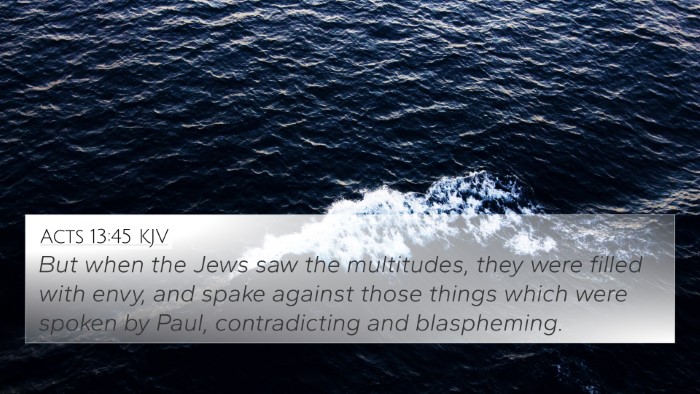Understanding Matthew 27:18
Verse: "For he knew that for envy they had delivered him." (Matthew 27:18)
Verse Meaning and Context
This verse appears in a pivotal moment of the New Testament, specifically during the trial of Jesus before Pilate. It highlights Pilate's understanding of the motivations behind the religious leaders' desire to crucify Jesus. Each commentary offers insights that collectively enhance our understanding of this important biblical event.
Insights from Key Commentaries
- Matthew Henry: Henry emphasizes the deep-rooted envy that drove the religious authorities to hand Jesus over to Pilate. He discusses how envy can lead to irrational behavior and betrayal, reinforcing the idea that spiritual leaders were corrupted by their jealousy of Jesus' popularity and authority.
- Albert Barnes: Barnes notes that Pilate perceived that the accusations against Jesus were not founded on any real crime but rather stemmed from the envy of the chief priests. He describes this as a reflection of moral failure among the leaders who, rather than seeking truth, were motivated by jealousy.
- Adam Clarke: Clarke elaborates on the nature of envy and its destructive power. He explains that the religious leaders' envy was a significant factor in the events leading to the crucifixion, serving as a warning about the dangers of allowing envy to guide one's actions.
Connections Between Bible Verses
This verse is intricately connected to several other passages throughout the Bible. Understanding these connections can greatly enhance one’s biblical study and insight:
- Genesis 37:11: This verse discusses how Joseph's brothers envied him, which parallels the envy seen in Matthew 27:18.
- Proverbs 14:30: "A tranquil heart gives life to the flesh, but envy makes the bones rot.” This reflects the destructive nature of envy mentioned in Matthew.
- 1 Samuel 18:9: The relationship between Saul and David shows how envy can lead to hostility, similar to the scribes and Pharisees' plot against Jesus.
- Mark 15:10: This Gospel account also mentions that Pilate recognized that the religious leaders delivered Jesus out of envy.
- Luke 23:14-15: Pilate communicates the innocence of Jesus, mirroring the sentiment found in Matthew 27:18.
- James 3:16: "For where you have envy and selfish ambition, there you find disorder and every evil practice,” echoes the chaotic spirit that motivated the leaders against Jesus.
- Acts 7:9: This passage narrates Joseph's further rejection, drawing a similarity to Jesus' mistreatment due to the envy of leaders.
Why Cross-Referencing is Important
Cross-referencing Bible verses is a powerful tool for understanding Scripture more deeply. It allows us to see thematic connections, consider how different authors address similar issues, and develop a more holistic view of biblical teachings.
Tools for Effective Cross-Referencing
- Bible Concordance: Essential for quickly finding where certain themes or keywords appear.
- Bible Cross-Reference Guide: A structured way to see connections and parallels across various verses.
- Online Tools and Databases: Numerous resources that facilitate searching through biblical texts for connections.
- Bible Chain References: Systems that link related verses together providing continuity of ideas.
Conclusion
Matthew 27:18 serves as a reminder of the destructive power of envy and the importance of seeking truth. Through cross-referencing and thematic connections among verses, we learn not only about Jesus' trial but also about human nature and the importance of aligning one's actions with godly motives.
Key Takeaways
- Understanding the motivations behind actions is crucial in interpreting biblical texts.
- Envy can corrupt even the highest leaders, leading to tragic consequences.
- Cross-referencing enhances biblical study, revealing intricate connections and themes.













